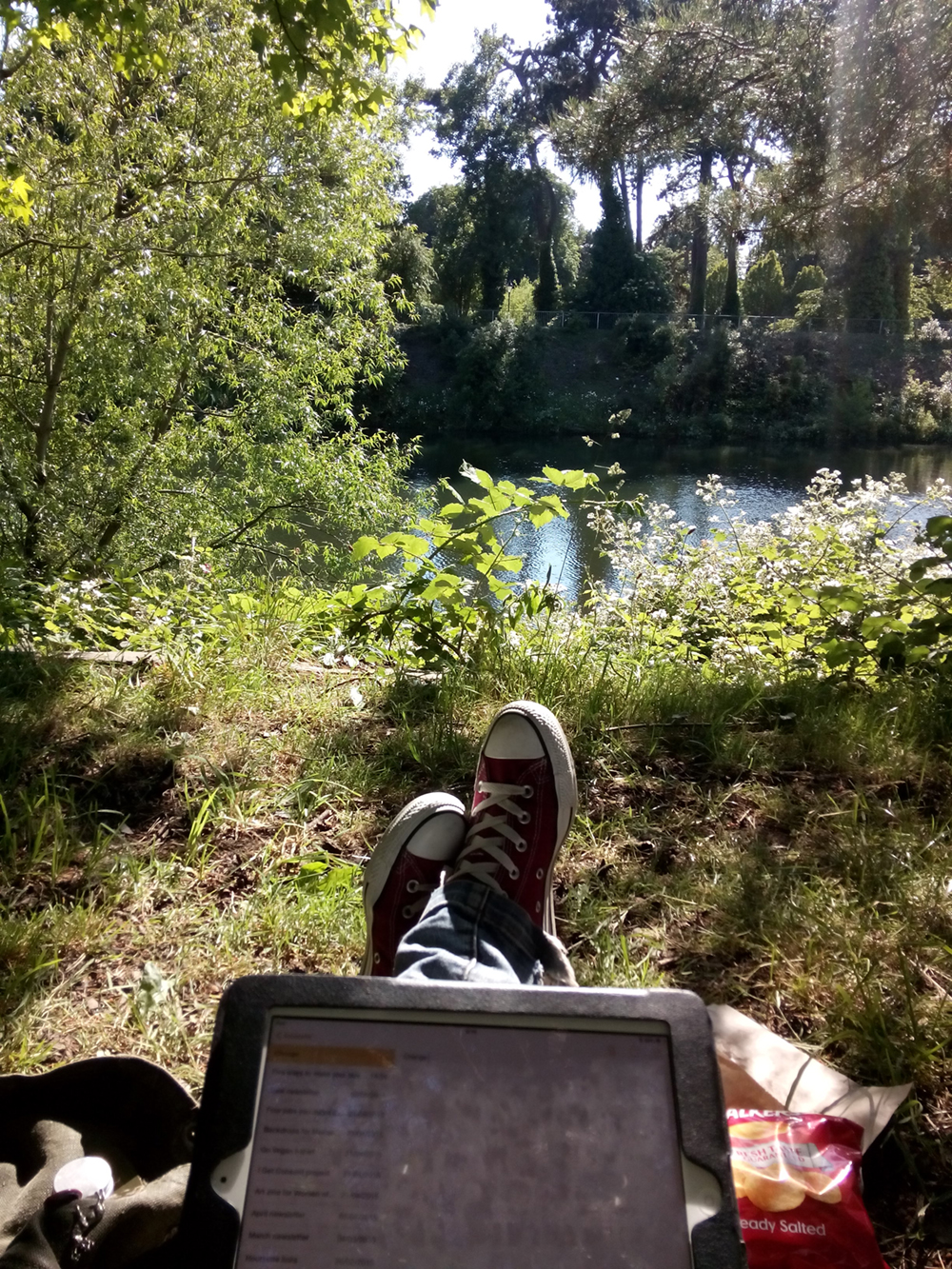Musings on creativity, doing things differently and public parks involving Virginia Woolf quotes
I’m sat in Cardiff’s glorious Bute Park next to Thomas Martin who’s composing some incidental music for a mutual client and the sun is shining and the pine tree over us whispers with the breeze and we’ve just eaten some giant vegan jaffa cakes and are drinking coffee and all is right with the world.
These are not things that we do very often (the Welsh weather sees to that) but they are probably things we should do more often. Tom has been stuck for ideas about his guitar piece and I have been scratching my head about ways to radically update the design of an educational brochure. Lo and behold, sit thee by a river in a park in summer and the eureka moments they will come.
Tom hears a car beep in the distance at the same time as a picking a particular chord and realises in a flash that the track needs some plaintive Scandinavian horns in the background. I observe the colours of the sky, the pine, the river and the magenta of someone’s coat on the other side of the Taff and that’s my colour palette sorted. I think of ways to replicate that feel of sunlight filtered through branches and remember distant walks through pine forests to a beach in the South of France when I was small, and I wonder how to bring that child-like sense of wonder, sense of awareness into this educational brochure.
Here is Virginia Woolf describing the experience of her character Peter Walsh in Regent’s Park, from Mrs Dalloway:
By conviction an atheist perhaps, he is taken by surprise with moments of extraordinary exaltation. Nothing exists outside us except a state of mind, he thinks; a desire for solace, for relief, for something outside these miserable pigmies, these feeble, these ugly, these craven men and women. But if he can conceive of her, then in some sort she exists, he thinks, and advancing down the path with his eyes upon sky and branches he rapidly endows them with womanhood; sees with amazement how grave they become; how majestically, as the breeze stirs them, they dispense with a dark flutter of the leaves charity, comprehension, absolution, and then, flinging themselves suddenly aloft, confound the piety of their aspect with a wild carouse.
I think a lot of us office-types are conditioned to feel bad about time spent away from our desks, but our desks are rarely the places where the inspiration is. In my one-and-only proper 9-5 job my boss couldn’t really understand my urge to go and stand outside, or go for a walk, or stare at the fishtank for 20 minutes in order to get an idea. I think he thought I was skiving. Isn’t it weird that we should be made to feel guilty about one of the most pleasurable parts of our job – the eureka moment?
 The Awen, the Muse, they are a flighty and tentative creature, more at home under trees and beside streams; while bramble-picking and beach-walking, in canvas tents and under a canopy of stars. I’ve had some of my best ideas while out surfing. I’ve been freelancing 12 years next month and still I feel guilty about this part of the process, this work which is not work, these conditions which are necessary for the most original and stirring creativity to occur.
The Awen, the Muse, they are a flighty and tentative creature, more at home under trees and beside streams; while bramble-picking and beach-walking, in canvas tents and under a canopy of stars. I’ve had some of my best ideas while out surfing. I’ve been freelancing 12 years next month and still I feel guilty about this part of the process, this work which is not work, these conditions which are necessary for the most original and stirring creativity to occur.
I am continuously overawed by the beauty and wonder of it all, and in these spaces of just being, that buddhist no-mind where there is nothing but the breeze ruffling the fine hairs of my arms, the warmth of the sun on my shoulders and the crunch of copper leaves underfoot, those spaces where I am no longer my name or occupation or species or anything at all in particular, those are the spaces into which the ideas come tumbling.
And I wonder how many other kinds of occupations could be made more creative, more efficient, more innovative, by half an hour in a park with a coffee and, perhaps, a giant vegan jaffa cake. I am thinking of the news that some public parks will “have” to be privatised because of council cuts and how arse-backwards that is – that we need these parks, we, as a whole, as a society, need them in a very real and tangible way, and that like the libraries which we’re also losing, they need to be freely available to all. I am thinking of how Woolf wrote about parks in Mrs Dalloway, as places where all kinds of people met and saw and crossed over and interacted and how they are spaces where boundaries are blurred and strange things can happen. Places of meditation, interaction, of peace and of noise, of crowds and of solitude, and how spaces like that could be important to all of us.
Septimus, the WW1 veteran haunted by shell-shock experiences Regents Park in Mrs Dalloway:
Happily Rezia put her hand with a tremendous weight on his knee so that he was weighted down, transfixed, or the excitement of the elm trees rising and falling, rising and falling with all their leaves alight and the colour thinning and thickening from blue to the green of a hollow wave, like plumes on horses’ heads, feathers on ladies’ so proudly they rose and fell, so superbly, would have sent him mad. But he would not go mad. He would shut his eyes; he would see no more.
But they beckoned; leaves were alive; trees were alive. And the leaves being connected by millions of fibres with his own body, there on the seat, fanned it up and down; when the branch stretched he, too, made that statement. The sparrows fluttering, rising, and falling in jagged fountains were part of the pattern; the white and blue, barred with black branches. Sounds made harmonies with premeditation; the spaces between them were as significant as the sounds. A child cried. Rightly far away a horn sounded. All taken together meant the birth of a new religion–
Google throws up plenty of academic studies into the benefits of public parks. The Design Council says that quality public space is important for economic reasons, for mental and physical wellbeing, for biodiversity, for traffic reduction, for children and young people’s development and for the reduction of crime. That’s pretty serious stuff. Any government that wanted to reduce the availability of green space to its citizens should expect to be fought tooth and nail. Just being in Bute Park has eased me through periods of grief, depression and uncertainty, never mind the number of times it has filled me with inspiration and enthusiasm, and I regard it, and spaces like it, as vital to my work and my wellbeing.

